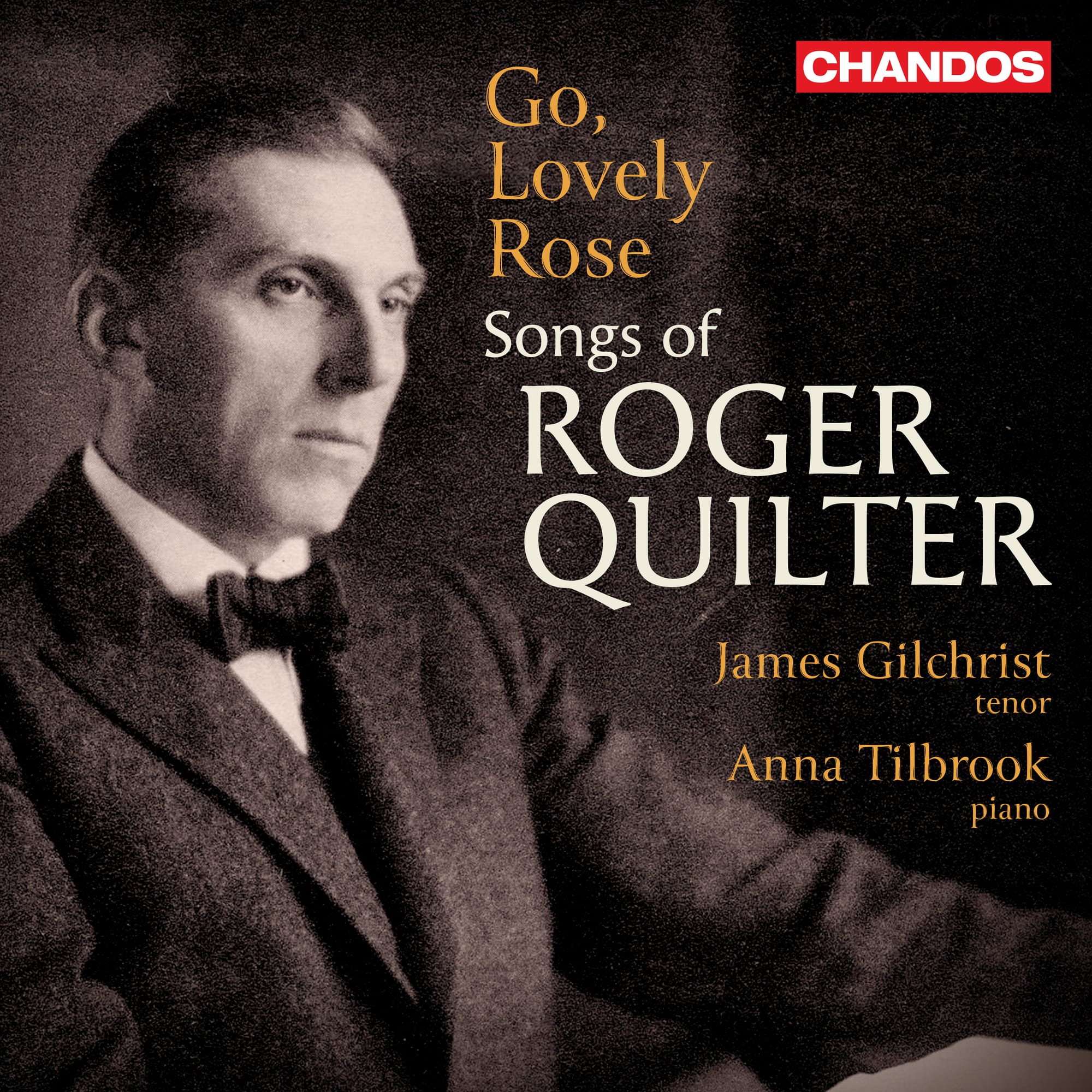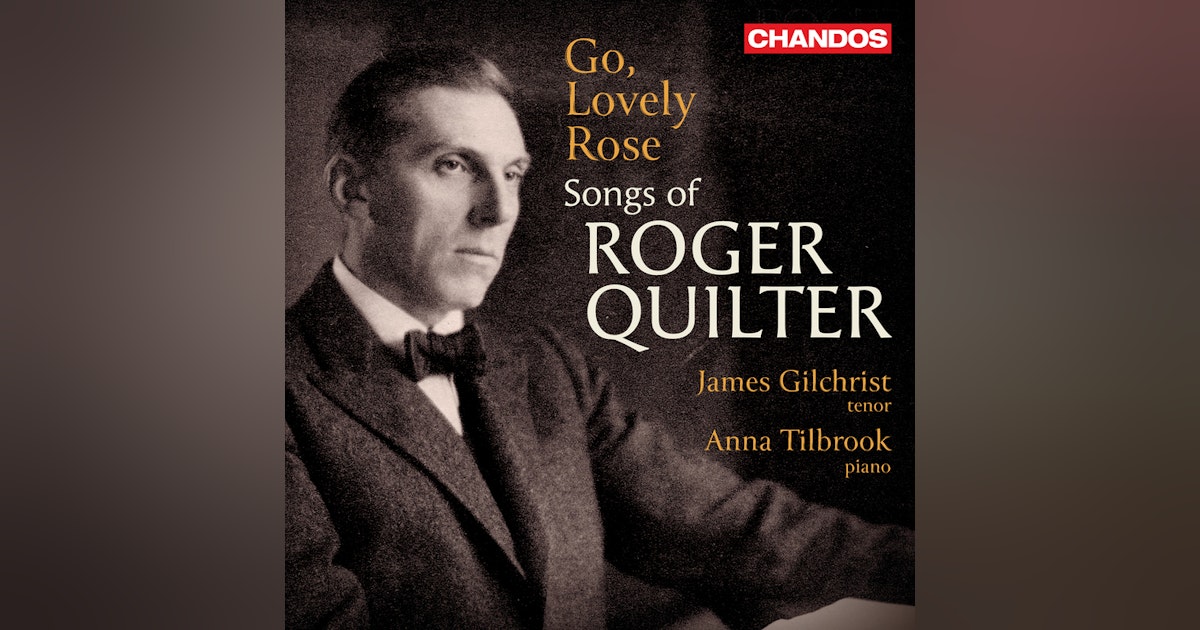Go, Lovely Rose: Songs of Roger Quilter

Firstly, what a beautiful disc this is, from each and every angle: the performer, one of the most experienced tenors active today, James Gilchist, with a superb pianist, Anna Tilbrook, captured in Chandos' trademark excellence of recording.
Secondly, what sevice to music itself. The output of Roger Quilter (1877-1953) needs more exposure: there is a rightness about these songs, each a little gem perfect in and of itself, that needs cherishing.
It comes as no surprise, then, that Quilter is best known for his contribution to English art song. He composed around 150 of them. The present album takes in both early works such as ‘Now sleeps the crimson petal’ through to late examples such as ‘The Ash Grove’.
There is something quintessentially English about Quilter's music: listen to his setting of ‘O mistress mine’ (Op. 6/2):
But the disc begins in stirring fashion, with ‘Blow, blow, though winter wind,’ Op. 5/3 (text from As you like it). The chords in the piano ar almost ecstatic, or at least they ae her in Tilbrook's rendition. Alongside that, Gilchist's voice soars beautifully; later in the song, with a far light piano writing, he seems almost confessional:
The disc is divided into a number of sections: Shakespeare Songs; A Floral Tribute; Folksongs; At the Graveside; German Songs; Songs of Love.
Quilter's setting of Shakespeare's ‘Come away, death’ (from Twelfth Night) seems to prefigure the graveside section. It is incredibly beautiful here, a serenade-like entreaty:
... complemented by ‘Fear no more the heat of the sun’ (Cymbelline), a song that ends with the most beauiful whisper. Gilchrist's quiet high register is mesmeric:
Interestingly, Anna Prohaska has recoded this song with pianist Eric Schneider for DG on her First World War-inspired disc, Behind the Lines. Prohaska's diction is superb, the simplicity of her rendition as heartwarming as Gilchrist's. (Interesting, incidentally, that Prohaska places Quilter in between three Ives songs on one side and three Eisler songs on the other, all of which emphasises the purity of utterance from both Quilter and singer):
Gilchrist's sweetness of tone is most appealing (as one can hear again in ‘Orpheus with his lute’). But it is the free-flow of ‘O mistress mine’ that seems the very essence of both Qiulter and Gilchrist/Tilbrook:
Quite right, too, that they finish the Shakespeare portion of the recital with a jaunty number: ‘Under the Greenwood Tree’ from As you like it (which source furnished the first of Gilchrist's set, offering a nice sense of congruence):
The next section is “A Floral Tribute,” place of deep, perfumed rest perhaps no better illustrated than via ‘Go, lovely rose’:
The clear link between Gilchrist and Tilbrook is everywhere apparent (they have previously recorded Winterreise together, which is tough to cement any elaionship), and one can hear this resonance in ‘A Last Year's Rose,’ complete with nightingale:
You may remember that this song has cropped up before, on a splendid disc of Songs of Travel and Home on Champs Hill records, performed by Julien Van Mellaerts and James Baillieu (review, and YouTube of that song).
Tilbook's opening to “Now sleeps the crimson petal’ is wonderful, too, as is he harmonic awareness (a delicious little progression) at the end of‘ ‘To Daisies,’ Op. 8/3:
One has to remember, though, Kathleen Ferrier in his song (with Phyllis Starr on piano), capturing surely Quilter's essence:
Time for some folksongs. And although Barbara Allen might begin simply, it is actually remarkably chromatic at its climax:
I do like the way Gilchrist blanches his tone for a simple rendition of The Ash Grove, Quilter's setting of a well-known Welsh melody:
The third section is “At the Graveside” and marks a significant shift in mood. “Autumn Evening” seems to lead naturally into the almost lullaby-like “Dream Valley”. The dark, desolate Drooping Wings takes some beating, though:
Gilchist's pure uppe register shines in Quilter's ‘Music, when soft voices die” (Op. 25/5), the last of the death songs.
t is interesting to have a set of “German Songs,” which gives linguistic variety. Thee is a change also I'm presenting a set of songs: the Four Songs of Mirza Schaffy, Op. 2. The title is misleading: written while a student in Frankfurt, the songs acally set Schaffy's student Friedrich von Bodenstedt. The third, “Ich fühle seine Odem” (The magic of thy presence) is a gem, hold back, almost whipped before a lovely blossoming in a long-limbed phrase:
The final song, “Die Helle Sonne leuchtet” (The golden sunlight's glow) is the closest to an Austro-Germanic utterance, particularly in some vote cadential approaches.
Finally, the “Songs of Love” section, beginning with a setting of Shelley: the impulsive “Love's Philosophy, ”Op. 3/1 (Tilbrook is magnificent in the difficult piano part, Gilchrist though offering one of his less convincing readings). the lightness of the final “It was a Love and his Lass” (Op. 23/3) that seems the perfect close to this excellent disc, though:
There aren't that many all-Quilter song discs, although Chandos has rebased one previously (Benjamin Luxon) and of course there is Naxos (Anthony Rolfe-Johnson and Lisa Milne). Mark Stone has issued a notable disc on his own label, and of course there is John Mark Ainsley and Malcolm Martineau on Hyperion. Despite this notable competition/company, Gilchrist and Tilbrook, I would suggest, offer an invaluable disc.
This lovely disc is available at Amazon here; Prohaska and Schneider's Behind the Lines is available here.


